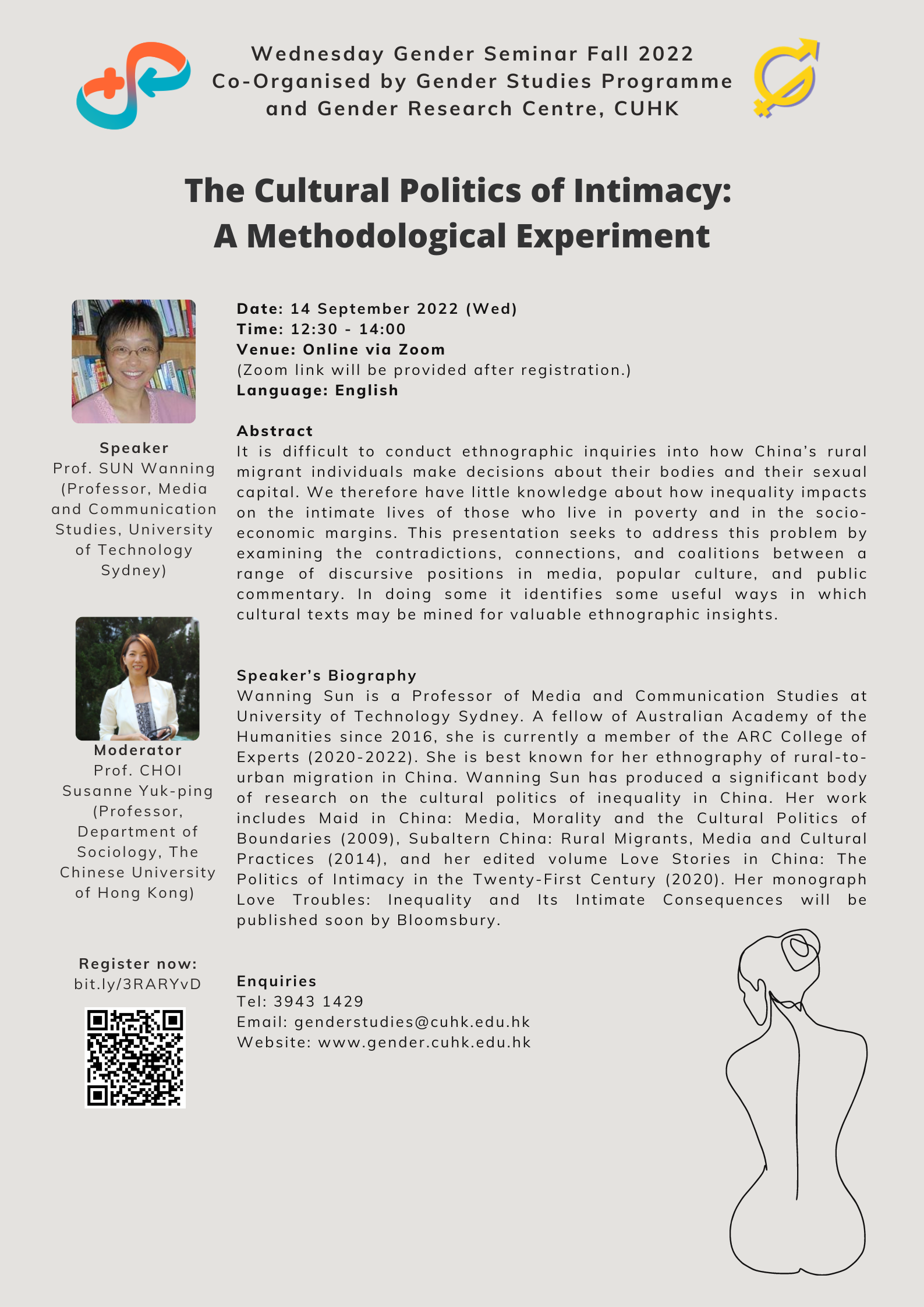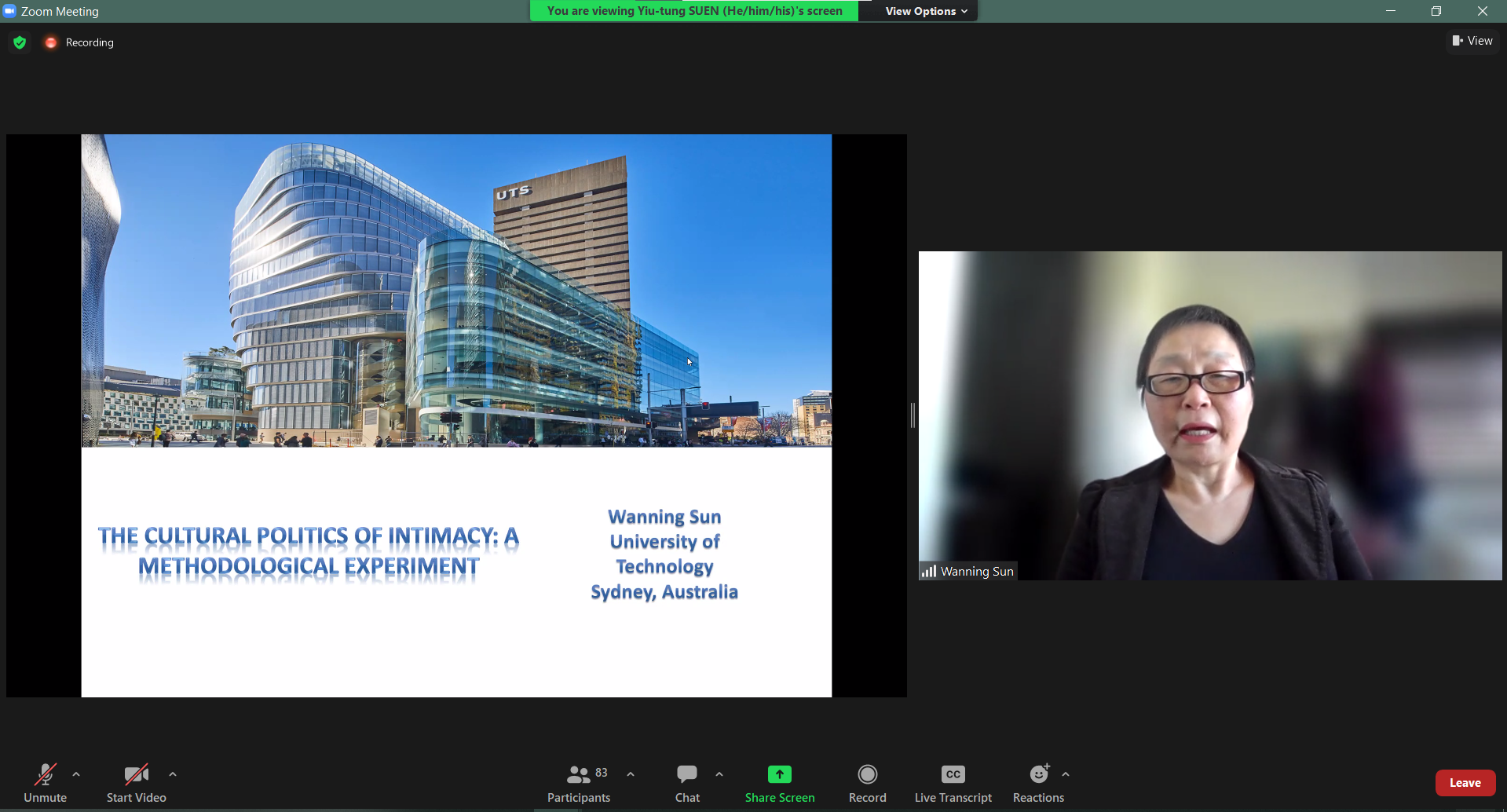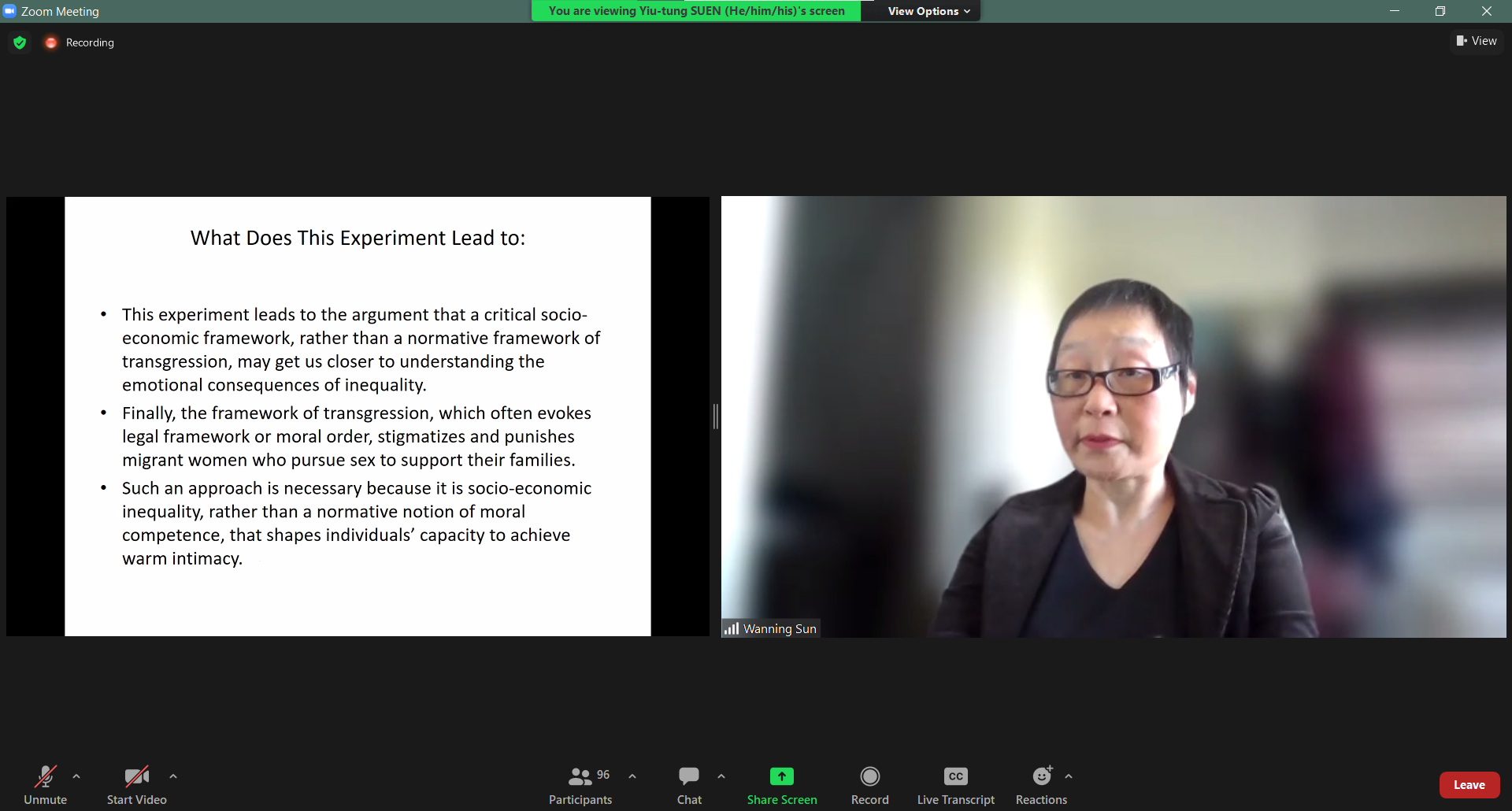Researchers tend to encounter difficulties when it comes to knowledge of how inequality affects the intimacy of the socio-economically marginal people. This presentation tries to figure out this problem by introducing a methodological experiment. The speaker, Prof. SUN Wanning from the University of Technology Sydney, addressed how she conducted this experiment by analyzing the contrasts, coalition, convergence and collaboration of the discursive relationships in social media, popular culture, and public criticism.
Generally, it is challenging to carry out conventional ethnographic researches when ethnographers seek to know how China’s rural migrants experience their intimate and sexual lives. Because there are methodological difficulties in investigating one’s negative love life and documenting their “dark intimacy.” Prof. SUN attempts to offer a new solution to this obstacle with a methodological experiment: to study a wide range of textual materials, by contrast, coalition, convergence, and collaboration. Her material sources include state media, labour literature, sweat-shop management’s statements, statements in an NGO’s newsletter, etc. This kind of experimental methodology dialogues with the absence of first-hand ethnography. Making good use of the narrative nature of ethnography, it regards the creators or gatherers of the textual materials as surrogate ethnographers. It thus puts forward a new concept, “‘second-hand’ ethnography” or “surrogate ethnography”.Instead of setting up a hierarchy of truthfulness, this new concept intends to ferret out the cultural politics through their discursive relationships. This experiment makes for a critical socio-economic framework in place of a normative framework of transgression. Whilst the latter one usually draws out legal or moral issues and leads to stigmatization and punishment, neglecting the emotional consequences. Prof. SUN also argues that it is socio-economic inequality but not a normative idea of moral capacity builds peoples’ abilities to reach out warm intimacy. Hence, it is of necessity to come up with such an approach.
撰文:DENG Zhuoyun
In the Wednesday Gender Seminar, held on September 14, 2022, Prof. SUN Wanning, from Media and Communication Studies at the University of Technology Sydney, shared difficulties she encountered in the process of ethnographic research and presented a special case which involved various discursive positions in series of textual materials, as a powerful solution to overcome the methodological troubles. By outlining her research trajectory, Prof. Sun mentioned that the socio-economic marginalised experienced intimacy as a new notion of ‘dark intimacy’ that is purchased, violent, or injurious. Since intimacies nowadays are public social goods that not everybody has equal access to and needs to invest bodily and emotional capital, it is crucial to consider how inequality marginal groups suffer impacts their love lives. Also, first-hand ethnology may confuse the researchers due to the private essence or absence of intimacy. This led to questions about how scholars should integrate and make sense of collected data in the cultural context. Inspired by Huang Yingying, Eva Illouz, and Judith Farquhar, Prof. Sun addressed that second-hand ethnology, or surrogate ethnology, can be helpful when treated as particular narratives rather than neutral documents. To be specific, Prof. Sun introduced a project about how Foxconn sex workers were represented in textual materials with varied positions, including commercial and state press, Foxconn management’s statement, their self-statement from NGOs, lowbrow magazines, and Dagong literature. Their attitude toward sex workers varied, and female workers’ motivations to become sex workers were depicted differently, mainly in two ways: a normative framework of transgression(legal and moral order) and a socio-economic framework(supplying the family’s finical needs). Between texts, four relationships: collaboration, coalition, contrast, and convergence, emerged and mutually contributed to understanding which and how the latter framework, rather than the former, gets us closer to the consequences of inequality. Thus, Prof. Sun concluded that the experiment analysing clusters of texts and their conceded perspectives is necessary since it is inequality that shapes female workers’ capacity to achieve a warm intimacy, not the normative notion of moral competence. In summary, Prof. Sun highlighted the importance of understanding and being attentive to power relations in diverse texts. To Introduce and examine a series of cultural texts does not mean doubting whether the ethnology is authentic and establishing the hierarchy of truthfulness, but revealing the cultural politics through their relationships.
撰文:DU Ruini
The nature of intimacy, being private and obscured, often leads to the absence of first-hand ethnography. Dark intimacy that is purchased, violent, or injurious, poses a further methodological difficulty in the investigation. In this circumstance, a range of cultural texts contribute important ethnographic insights to Prof. Sun Wanning’s studies of the intimate lives of the marginalized. Considered as second-hand ethnography, the textual material is produced and mediated by a diversity of “surrogate ethnographers”, requiring a critical analysis in and among the texts, for instance, the discursive privilege they each possess, different agendas and readers, as well as the tension arising among them.
Prof. Sun examines various aspects of the texts and suggests four main discursive relationships: contrast, collaboration, coalition, and convergence. For example, contrast is reflected in the disparity between the narratives by different media. State media and commercial media adopt a normative framework in their commentaries on migrant women workers as part-time sex workers. The documented intimacy is simplified as a transgression, with what has truly constituted the women’s plights and decisions left undiscussed. Contrasting such an approach is a sex worker’s storytelling in an NGO’s newsletter, which offers a glimpse of a woman’s emotions, struggles, and the certain familial, political, and economic circumstances she faces to decide on her body and sexual capital. While in some literary works included in Prof. Sun’s studies, a different relationship defined as collaboration can be discovered. From novels depicting migrant workers’ dark intimacy to poems based on the real lives of sex workers, these texts approach the intimate lives of the marginalized from their own perspective instead of moral judgements, with the sensibility of the political and economic influences. These texts support and enhance the legitimacy of one another.
The normative framework of transgression neglects individuals’ dilemmas and the socio-economic contexts, typecasting and stigmatizing the marginalized. Prof. Sun thus argues for a critical socio-economic approach to intimacy that explains how socio-economic inequality pervasively affects individuals’ intimate lives, as well as the studies of the discursive relationships that contribute to a more comprehensive understanding of cultural politics.
撰文:FONG Yuk Ping





A
A
A
聯絡我們